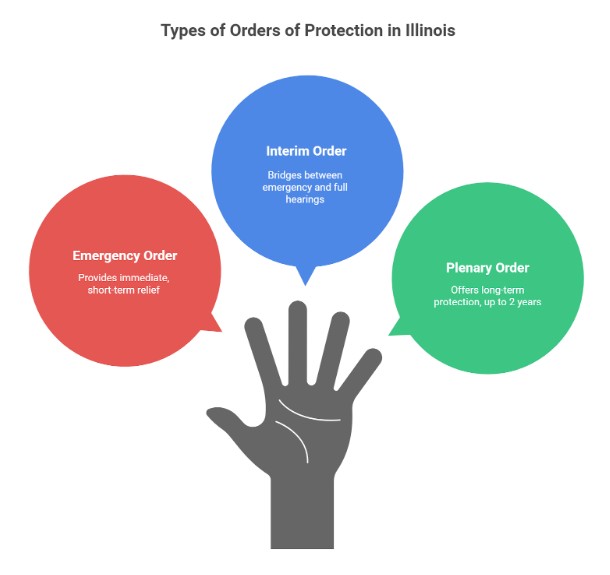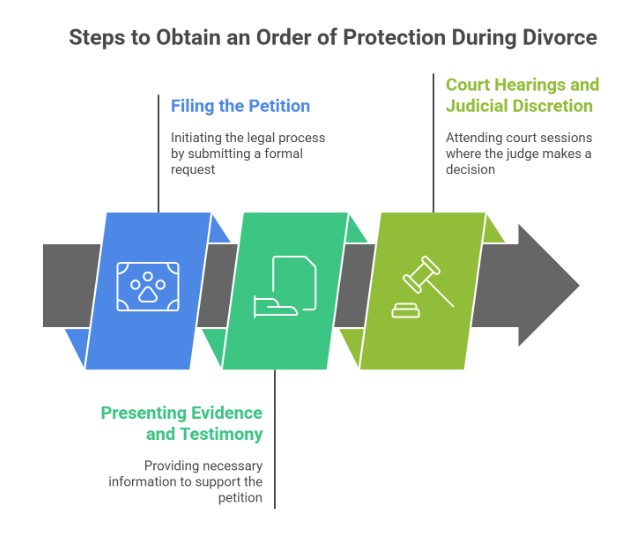When someone you love can’t make safe choices about their health, money, or daily life, families around Chicagoland face tough decisions.
Adult guardianship in Illinois is a court process that allows you to make decisions for an adult who can’t manage their personal or financial affairs.
Maybe you’re caring for an aging parent in Oak Park or a sibling with disabilities in Naperville. Understanding what guardianship entails can help you protect your family member and avoid costly mistakes.
Filing for guardianship isn’t just a checklist. The court wants medical proof, proper notice to everyone involved, and sometimes testimony about why less restrictive options just won’t cut it.
Many families believe they automatically have the right to make decisions for their adult relatives. Illinois law doesn’t work that way. You need a judge’s approval before you can legally act for another adult.
Key Takeaways
- Adult guardianship starts with a court order—a judge must approve your petition and supporting medical evidence.
- Illinois offers limited, plenary, and temporary guardianship, each depending on the level of assistance your family member needs.
- The process usually takes months and involves court fees, medical evaluations, and annual reporting requirements.
When Adult Guardianship Is Necessary in Illinois
Families look at guardianship when a loved one can’t safely handle personal care or money decisions. You’ll want to know whether court intervention is necessary or whether a power of attorney would suffice.
To appoint a guardian, the court must find, by clear and convincing evidence, that the person meets Illinois’ definition of a person with a disability and lacks capacity to make the relevant decisions (personal care and/or financial affairs).
Signs Your Family May Need Court Authority
Adult guardianship usually becomes necessary when your family member can’t make or communicate basic life decisions.
Maybe your loved one keeps forgetting to take medication or leaves the stove on. Sometimes, they give away money to strangers or fall for the same scam over and over.
Common warning signs include:
- Not recognizing danger or protecting themselves from harm
- Trouble managing bills, leading to shut-off notices or eviction threats
- Refusing medical treatment without understanding the risks
- Getting exploited by caregivers, family, or strangers
They might also lack the capacity to sign legal documents, such as powers of attorney. In Illinois, adult guardianship applies when someone is 18 or older and can’t make basic life decisions or manage property.
Think about whether you’ve tried less restrictive options before you jump into the guardianship process.
Quick Triage—Guardianship vs Power of Attorney vs Supported Decision-Making
Power of attorney works if your loved one still understands what they’re signing. They give you authority on their own terms. It’s cheaper and faster than going to court.
In Illinois, supported decision-making is recognized as a less restrictive alternative to guardianship for adults with intellectual and developmental disabilities who need assistance with daily living decisions, while retaining their legal rights.
They keep their legal rights, just get more support. Illinois law actually recognizes this as a less restrictive alternative to guardianship.
Guardianship is for when someone can’t sign legal documents or make decisions on their own. The judge determines whether they lack capacity and need someone to act on their behalf.
If your loved one is still capable, try a power of attorney. If they just need help, supported decision-making might work. Only go for guardianship if nothing else will keep your family member safe.
Cooper Trachtenberg Law Group, LLC can help you evaluate whether an Illinois adult guardianship or a less restrictive option is appropriate for your loved one. Schedule an appointment.
If you’re ready to get started, call us now!
Limited vs Plenary vs Temporary Guardianship (What Each Means)
Illinois has three main types of adult guardianship, each for a different level of need. The key difference is the extent of the guardian’s decision-making authority.
Limited Guardianship—Specific Powers Only
A limited guardian only gets authority over certain parts of a person’s life. The court spells out exactly what your loved one needs help with, and leaves them in control of the rest.
Perhaps the court authorizes a limited guardian to make medical decisions but not financial decisions. Or maybe just bill paying while your family member still chooses where to live.
This option respects your loved one’s independence as much as possible. They keep control over what they can still manage. The court order outlines the guardian’s powers and the person’s retained rights.
Limited guardianship is great when someone has specific challenges but doesn’t need full oversight. It’s often the go-to choice since it’s the least restrictive.
Plenary Guardianship—Broad Authority
Plenary guardianship gives the guardian full authority over all personal and financial decisions. The person loses the legal right to make their own choices in those areas.
A plenary guardian decides where someone lives, what medical care they get, and how their money is spent. This is the strictest form of guardianship in Illinois.
Courts only grant plenary guardianship if someone truly can’t make any major life decisions safely. You’ll need to provide medical evidence and, often, expert testimony to support this.
Temporary Guardianship—Emergency, Time-Limited Relief
Temporary guardianship generally expires within 60 days of appointment (or when a permanent guardian is appointed), and extensions are limited to specific situations; in some circumstances, an extension may last no more than 120 days from the original appointment date.
This helps someone who needs immediate protection. Maybe your parent had a stroke and can’t make medical decisions in the hospital, or there’s a financial emergency that can’t wait.
You must file for permanent guardianship before or at the same time as you request temporary guardianship. The temporary order usually gets replaced by a limited or plenary guardianship after the hearing.
Type of Guardianship
| Type | Best For | Pros | Risks | Typical Proof Needed |
| Limited | Adults who need help in specific areas only | Preserves autonomy; less restrictive; targeted support | May not cover all needs if the condition worsens | Medical records showing specific deficits; evaluations documenting capable areas |
| Plenary | Adults are unable to make any major decisions | Complete protection; clear authority for all decisions | Total loss of independence; potential for abuse | Comprehensive medical evaluations; multiple expert opinions; evidence of global incapacity |
| Temporary | Emergencies requiring immediate action | Fast court response; protects during a crisis | Very short duration (60 days max); must file permanent petition | Evidence of immediate danger or urgent need; medical crisis documentation |
Guardian of the Person vs Guardian of the Estate (Or Both)
Illinois courts can appoint a guardian for personal care decisions, financial matters, or both. One person can handle both roles, or the court can assign different people to each.
Guardian of the Person—Healthcare, Placement, Daily Living Decisions
A guardian of the person makes personal and daily care decisions for someone who can’t make them on their own. This guardian makes medical choices, picks healthcare providers, and decides where your loved one lives.
The guardian of the person arranges medical appointments, consents to treatments, and handles therapy. They also decide about social activities and relationships.
This kind of guardianship focuses on healthcare and physical care, not finances. Your loved one might need help with personal stuff, but still be able to manage their own money. The guardian ensures they receive appropriate care and live safely, while respecting their preferences.
Guardian of the Estate—Assets, Bills, Income, Financial Protection
A guardian of the estate manages financial assets and property for someone who cannot manage them themselves. This guardian pays bills, manages accounts, and protects investments.
The guardian of the estate handles all financial matters, such as collecting income, paying taxes, and managing property. They must maintain accurate records and report regularly to the court.
This guardianship concerns managing finances and property—not personal care. Sometimes, a family member needs help with finances but can still make their own healthcare decisions. If it fits, the court can appoint co-guardians to share financial responsibilities.
Gathering medical reports and family notices? Work with Cooper Trachtenberg Law Group, LLC to file correctly in Cook County and the Chicagoland suburbs—Contact us today.
If you’re ready to get started, call us now!
Before You File—What Illinois Requires You to Gather
Illinois law asks for specific documents and info before you file for adult guardianship. You’ll need medical reports, detailed petitions, and proof that you’re ready to serve as a guardian.
Petition Details the Illinois Probate Act Requires
The Illinois Probate Act, found at 755 ILCS 5, outlines the requirements for your petition. You have to estimate the total value of the proposed ward’s estate and property.
This means listing bank accounts, real estate, vehicles, and personal belongings. It’s not just a formality—the court actually wants to know what’s at stake.
Your petition should also include the names and addresses of the proposed ward’s close relatives. We’re talking about parents, adult children, siblings, and a spouse, if applicable.
The court uses this information to notify family members about the guardianship case. Forgetting someone can slow things down or cause headaches later.
You’ll need to explain why guardianship is necessary. Describe the person’s disabilities or conditions that keep them from making important decisions for themselves.
If you’re starting a case for guardianship of an adult, you should gather this info before filing. The more details, the better.
The Probate Act of 1975 also asks you to specify the type of guardianship you want. You can request guardianship of the person, the estate, or both. Make sure you’re clear about which one fits the situation.
Medical/Clinical Report Requirements and Timing
Illinois wants a physician’s report that’s both recent and thorough. The required evaluations must have been performed within 3 months of the filing date (and, in certain intellectual disability cases, a psychological evaluation may be within 1 year of filing).
If the report’s older than that, the court won’t accept it. The report must include the analysis and results of evaluations of the respondent’s mental and physical condition completed within the required timeframe, along with the evaluators’ credentials and signatures.
The report should say whether the person can make decisions about healthcare, money, and daily life. The physician must list specific disabilities or diagnoses and explain how they affect the person’s independence.
The report must include the names and signatures of all evaluators whose evaluations underlie the report, and one evaluator must be a licensed physician (or, in certain intellectual disability cases, a licensed clinical psychologist).
Proposed Guardian Readiness Checklist
Before you file, make sure you know what you’re signing up for as a guardian. You’ll be responsible for the ward’s well-being and, potentially, its finances.
The court expects you to act in its best interest at all times. It’s a big responsibility.
Here’s what you need to confirm:
- You’re over 18 and a legal resident
- You don’t have felony convictions that would disqualify you
- You can dedicate time to managing the ward’s affairs
- You know you’ll have to file annual reports with the court
Think about any conflicts of interest you might have. If you stand to inherit from the ward or could benefit financially, tell the court up front.
If you’re managing the ward’s estate, you might need to post a bond. Co-guardianship is an option as well—sometimes families split the duties between two people. Worth considering if it fits your family.
Pre-Filing Checklist
| Document/Item | Who Provides It | Common Mistakes |
| Petition for guardianship | You (the petitioner) | Incomplete property valuations, missing relative addresses |
| Physician’s report | Licensed doctor examining ward | Report older than 90 days, insufficient detail on disabilities |
| Proposed ward’s financial records | Bank, ward, or family | Outdated statements, missing accounts |
| List of relatives | You (the petitioner) | Forgetting ex-spouses, half-siblings, or estranged family members |
| Guardian background information | You (the proposed guardian) | Not disclosing criminal history or conflicts of interest |
The biggest mistake? Waiting too long to get the medical report. Schedule the exam early to avoid missing the 90-day window.
People also underestimate the ward’s assets. Establishing guardianship requires accurate financial disclosure.
Missing bank accounts or property can delay your case or make the court question your credibility. Also, don’t forget to notify the proposed ward—they have the right to participate and object if they want.
How the Case Proceeds in Cook County (What to Expect)
If you’re going for adult guardianship in Cook County, the process moves through the probate court system. You’ll complete the forms, notify the appropriate parties, and then attend a hearing where a judge decides what happens.
Where to Start—Cook County Adult Guardianship Forms and Court Hub
Adult guardianship cases go to the Probate Division at the Daley Center in Chicago. You can get help with paperwork at the Pro Se Adult Guardianship Help Desk—in person or remotely.
As of the Cook County Clerk’s Probate Division Fee Schedule effective October 1, 2025, the new case filing fee is $379, and the appearance fee is $250 for Probate Division case types, including Person, Estate, and Estate and Person. Because fees can vary by case type, confirm the current schedule before filing.
Notice, Service, and Why Timing Matters
After you file your petition, the court needs time to notify everyone involved. Illinois law directs the court to set a hearing within 30 days of the petition’s filing, though actual scheduling can vary by county and courtroom.
The proposed ward must get notice and has the right to participate. That’s not optional—it protects their rights. Parents, adult children, and others also get notified during this time.
The court sometimes appoints a guardian ad litem to investigate and report back. This person interviews the proposed ward, reviews the medical records, and provides the judge with an independent recommendation.
The Hearing—Key Rights and What the Judge Decides
At the hearing, the judge looks at your petition, medical evidence, and any testimony. The proposed ward can attend, object, and even request their own attorney.
The judge decides if guardianship is needed and what kind of authority you’ll get. You may be appointed guardian of the person, the estate, or both, depending on the circumstances.
Background checks are conducted on potential guardians before the judge makes a final decision. The court checks your ability to do the job and looks for any conflicts of interest.
If the judge approves, you’ll receive Letters of Office that allow you to act on behalf of the disabled person.
Costs and Practical Planning (Chicagoland Reality Check)
Filing for guardianship in Cook County comes with upfront court fees and ongoing legal expenses. The total cost depends on the ward’s estate value and the complexity of the case.
Attorney fees and annual reporting add to the financial commitment. Families should plan for these costs.
Cook County Probate Filing Fees to Budget For
Cook County filing fees for adult guardianship depend on what you’re asking for. It’s $50 for person-only guardianship, $70 if the estate’s up to $15,000, and $105 for estates over $15,000.
The petitioner usually pays these fees upfront. Sometimes, the court lets you use the disabled person’s estate to pay. Additionally, you’ll need to budget for service of process, court reporter fees, and certified copies of court orders.
What Usually Drives Total Cost Up
The total cost varies significantly depending on whether the case is contested, whether estate administration is involved, and whether the court appoints professionals (such as a guardian ad litem or independent experts).
Ask counsel for a case-specific estimate after reviewing the facts and the county’s requirements.
The court might require medical or psychological evaluations at your expense. If private counsel is out of reach, you could get help from the Office of State Guardian or Public Guardian services.
Annual accounting and reporting requirements entail ongoing costs as well. Your guardianship lawyer might charge $500 to $2,000 each year to prepare court reports and handle estate administration.
Conclusion
Making decisions about adult guardianship in Illinois requires careful thought. You’ve got to know the legal responsibilities before you file a petition with the court.
Key points to remember:
- Guardianship deprives another person of their legal rights.
- The process typically takes several months.
- You have to notify the proposed ward and any other involved parties.
- The court requires medical evidence and extensive paperwork.
- If you’re an estate guardian, you’ll need to file annual reports.
It’s smart to consider all alternatives before entering guardianship. Sometimes, less restrictive options—like powers of attorney, healthcare directives, or supported decision-making—can help your loved one without stripping away their independence.
Getting help from an attorney makes everything less overwhelming. They’ll walk you through the paperwork, help you prep for court, and make sure you’re not missing anything important.
If adult guardianship is necessary, get guidance on next steps, filings, and reporting for Chicagoland families—Schedule an appointment with Cooper Trachtenberg Law Group, LLC.
Contact Us Today For An Appointment
Frequently Asked Questions
What is adult guardianship in Illinois?
Adult guardianship is a court-ordered legal relationship where a judge appoints someone to make decisions for an adult (18+) who cannot manage personal care or finances due to incapacity. Illinois courts require clear evidence before granting guardianship.
Who may need a guardian in Illinois?
An adult who cannot make responsible life or financial decisions due to mental deterioration, physical incapacity, developmental disability, or similar limitations may need a guardian, according to Illinois guardianship law.
What are the types of guardianship in Illinois?
Illinois law provides limited, plenary (full), and temporary guardianship options, depending on the level of assistance required for personal care, financial matters, or both.
How does the adult guardianship process work?
To start, a petition and medical report must be filed with the Probate Court. The court then schedules a hearing, notifies interested parties, and may appoint a guardian if legally justified.
Can adult guardianship be used as a protective measure in an emergency?
Yes. Temporary guardianship may be appointed in emergencies to protect an adult until a permanent hearing can be held, typically due to urgent safety or financial concerns.
How long does it take to become a guardian in Illinois?
The timeline varies by court and case complexity, but most adult guardianship petitions in Illinois typically progress through planning, evaluation, and a hearing over several weeks to a few months.
What alternatives exist to adult guardianship?
Alternatives include powers of attorney for healthcare/property and supported decision-making agreements, which allow adults to keep legal rights while receiving assistance. These are often less restrictive than guardianship.





















